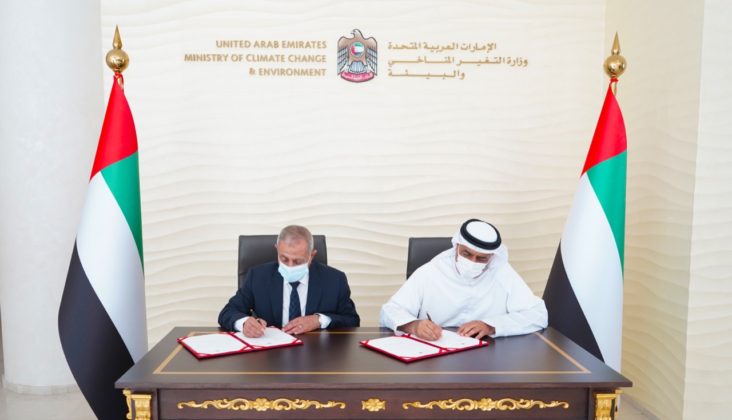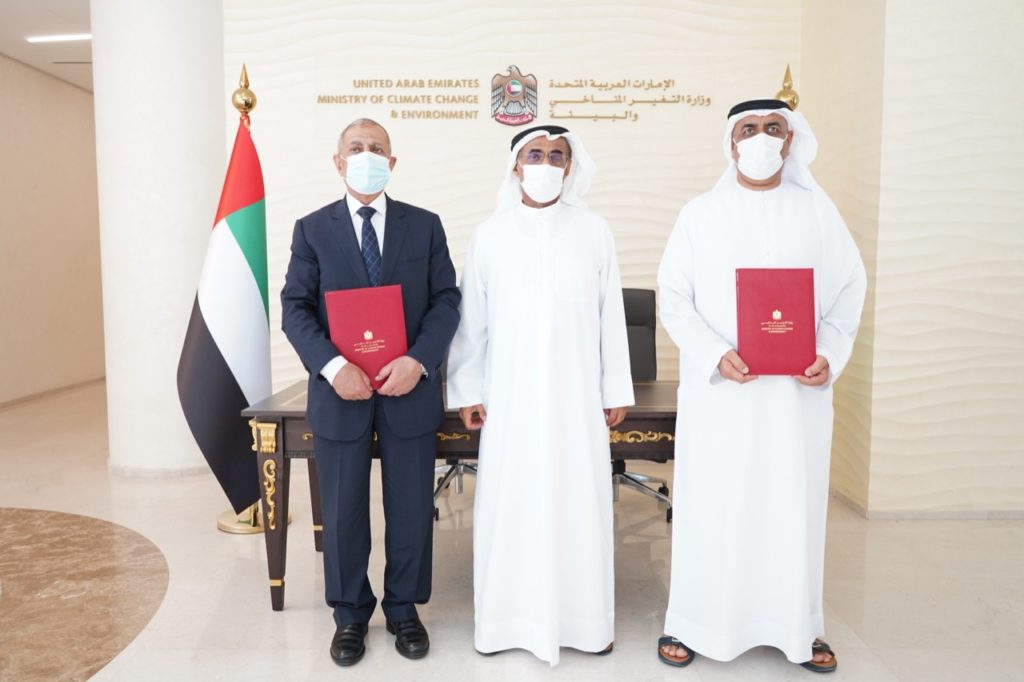Arab Academy For Science, Technology And Maritime Transport Branch In Sharjah Collaborates With UAE Ministry Of Climate Change And Environment

The Arab Academy for Science, Technology and Maritime TransportBranch in Sharjah (AASTS) has signed a Memorandum of Understanding (MoU) with the UAE Ministry of Climate Change and Environment (MOCCAE). This supports AASTS’ mission to protect the marine environment, enhance fish wealth, and provide research and development services. The MoU aims to employ AASTS’ capabilities and the expertise of its staff to serve and develop the marine environment and curb marine activities that are contributing to climate change. The cooperation also includes protecting and maintaining the ecological balance in the Arabian Gulf and the Arabian Sea, which the UAE overlooks.
The MoU was signed by H.E. Sultan Alwan, Assistant Undersecretary for the Regions Sector and Acting Assistant Undersecretary for the Food Diversity Sector at MOCCAEand H.E. Dr. Ismail Abdel Ghaffar Ismail Farag, President of AASTS.
Prospects for cooperation stipulated in the MoU cover several areas,including protecting the marine environment and developing the country’s natural resources which serve its agenda; providing education and training; conducting specialised research in the field; in addition to building capacities in digital applications,artificial intelligence (AI) and big data to develop marine food resources and combat the effects of pollution and harmful emissions.
H.E. Alwan said: “To support climate change mitigation and adaptation – a strategic priority of the UAE – MOCCAE works closely with public and private sector stakeholders to incorporate the requirements of climate action in future planning across all sectors with the aim of ensuring a better future for the current and next generations.”
He added: “In line with its focus on the marine environment, the Ministry is keen to build synergies with relevant entities that can help sustain its natural resources and biodiversity. Through the MoU with AASTS, we seek to capitalise on the Academy’s rich expertise in this area. We commend AASTS’ role in providing world-class scientific research and academic studies to inform maritime protection efforts in the region.”
Developing economic competencies
H.E. Dr. Farag said: “Our relationship with the UAE is special. We realise the unlimited support from the UAE’s leadership and decision-makers to protect the marine environment and ensure that the maritime sector adheres to all international standards that are in place to address the issue of climate change. We affirm that we devote all our capabilities that we have built over decades to be the scientific and academic arm that serves the environmental strategy of the UAE and the other Arab countries wishing to build their capacity to combat climate change, protect the environment, and develop their maritime and water resources.”
He clarified: “We believe that our partnership with the UAE will have a positive impact on developing the Academy’s other branches, considering that the UAE is listed among the thriving economies in the region. We will contribute to improving and developing the best marine environmental practices and provide support in terms of advisory and scientific studies for various applications and specialisations, ensuring that our actions have a positive impact on the global maritime industry.”
He added: “We have pledged at the Academy’s Sharjah Branch to be the first to respond to the call of His Highness Sheikh Mohamed bin Zayed Al Nahyan, Crown Prince of Abu Dhabi and Deputy Supreme Commander of the UAE Armed Forces, at the Government Summit 2015 to secure drinking water in the UAE for future generations after the depletion of oil in an area devoid of rivers and freshwater resources. Thus, protecting the marine environment and ensuring that its waters are free from chemical or biological pollution is the biggest challenge. Having and developing the latest desalination technologies with the least operational costs, and employing clean marine energy and its sustainable resources is among our top priorities as a national educational institution.”
Reinforcing AI capabilities and training to protect the marine environment
Commenting on the agreement between the Academy and MOCCAE in education and training, Dr.Capt. Ahmed Youssef, Associate Dean, College of Maritime Transport and Technology, AASTS, explained: “At AASTS, we focus on building, operating and ensuring the quality and sustainability of fishing vessels. We also provide marine education and training for the crew and provide training and technical advice on the inspection of ships to ensure their suitability for sailing in accordance with international standards. We use AI and the Internet of Things to build a smart and advanced system of sensors that monitor all the indicators necessary to get a comprehensive picture of the state of the marine environment in the UAE. This supports the development of blue economy and sustainability, which are the foundations for achieving prosperity and development for generations to come.”
He added: “The UAE has made great strides in digitalising its infrastructure and marine operations, as well as manufacturing smart ships. The UAE’s ports are the most automated worldwide, and its shipping companies have state-of-the-art digital platforms. We are equipped with all the necessary infrastructure to devise and employ AI and big data predictive analytics to build pioneering innovative applications to protect the UAE’s marine environment and take proactive and preventive measures to combat climate change. Our role in the Sharjah branch is to train and prepare Emiratis to benefit from these modern technologies and develop more smart solutions and applications that consolidate the position of the UAE as an incubator for innovation and the digital economy.”
Comprehensive outreach
The UAE is witnessing intense maritime activity with more than 21,000 commercial ships visiting the UAE ports annually. This makes it necessary to look for optimal means to prevent them from causing pollution of the marine environment and threatening the water and marine food security of the UAE. Therefore, it is imperative to launch a comprehensive awareness campaign on best practices to protect the marine environment and reduce the carbon footprint of the shipping sector. The media campaign may include platforms targeted at young people, and integrated global public relations campaigns in coordination with local and international maritime organisations and bodies that address the public in several languages.




